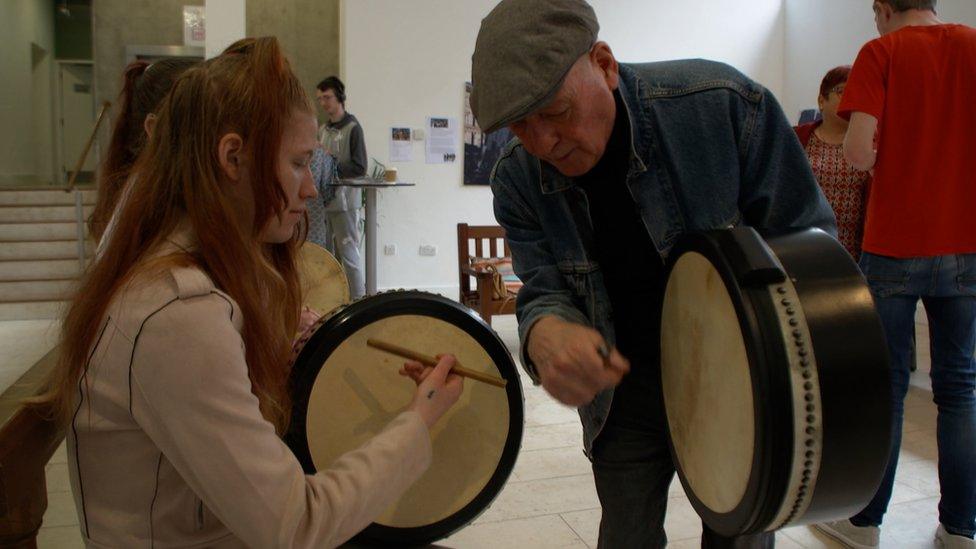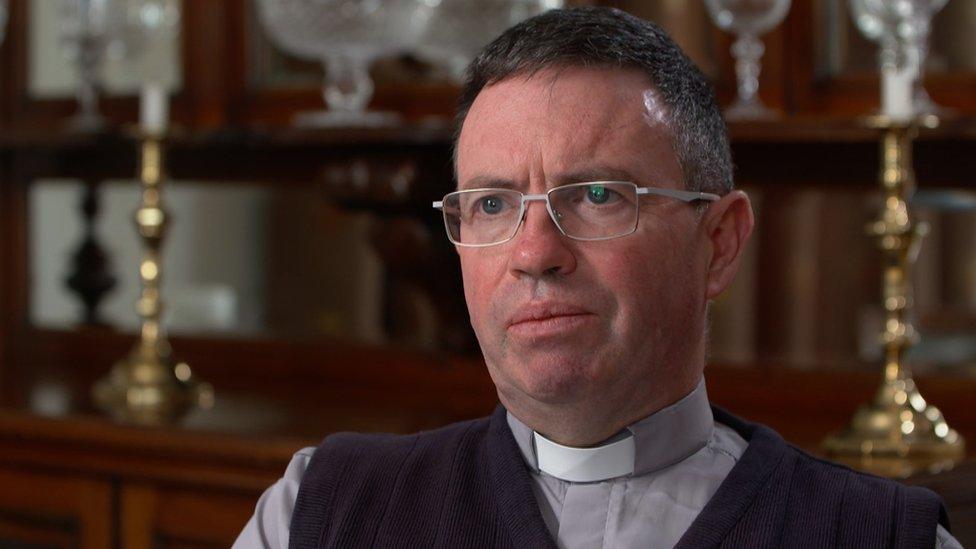Brexit: No deal threatens EU peace projects in Northern Ireland
- Published

Cross-community projects like 'Different Drums' rely on EU funding
A no-deal Brexit risks an "ignominious end" to EU funded cross-community peace projects in Northern Ireland, councils have warned.
A document seen by BBC Newsnight says leaving the EU without a deal could lead to the "unilateral withdrawal of funding" for such schemes.
This, with the economic concerns around Brexit, presents a "perfect storm", said a priest involved in the projects.
The UK government said it was committed to financially supporting peace in NI.
The "risk register" document, which dates from March 2019 and was prepared by local authority chief executives, says: "There are concerns around council partnerships and the possibility of some projects having to be cancelled, postponed or being brought to an ignominious end."
Northern Ireland has received about £1.5bn in "peace" funding from the European Union since 1995. This includes matched contributions from the Irish and UK governments.
The most recent tranche of funds is the €270m (£239) 2014-20 Peace IV programme, which is focused on bringing together young people from across sectarian divides.
The European Commission has confirmed funding for all Peace IV projects will be guaranteed until 2020 - even in the event of a no-deal Brexit. The UK government has made a similar pledge.
But plans for a "Peace Plus" programme, scheduled to begin in 2021, have been thrown into doubt by the possibility of a no-deal Brexit.
Community groups contacted by Newsnight confirmed their own fundraising operations are now suffering as a result, with some saying they have not proceeded with some post-2020 funding applications as a result of uncertainty.
Patrick Thompson works for The Bytes Project in Belfast, a community youth organisation.
"The Peace funding funds several hundred young people a year over four years," he said. "It's a big, big chunk of our work - it's very important for us and very important for the young people we work with as well."
The Special EU Programmes Body (SEUPB) which delivers Peace funding in NI said it has "firm commitment and support" from the EU and the UK and Irish governments for a new Peace Plus programme.
It added that the commitment to future funding after 2020 was a matter of public record.

Fr Martin Magill has been involved in running cross-community peace projects
Fr Martin Magill, who addressed the funeral of journalist Lyra McKee, who was shot dead while observing rioting in the Creggan area of Londonderry in April, told Newsnight the risks presented a "perfect storm" for Northern Ireland.
"The thoughts of the job losses, of how companies that trade north and south, how they manage to hold it together… plus all those who are involved in cross-border groups and how they manage to continue that sort of work. There's no question about it - there's a real sense of anxiety about all the uncertainty," he said.
The Northern Ireland council document warns that 80% of multinational companies based in Northern Ireland have plans to relocate if there's a no-deal Brexit because of the risk to their cross-border supply chains.
It cites concerns about a rise of criminality, "civil disturbances" and "opportunistic criminality", echoing the warnings in the UK government's recently published Yellowhammer document.
The UK government has promised a "Shared Prosperity Fund" to replace EU funding for poorer regions of the UK, including Northern Ireland.
But the NI councils' document states that "it is unlikely" such a fund "will be able to cope with demand in the short term, leading to significant disruption".
The UK government said it remains "committed to contributing financially to support peace in Northern Ireland in all circumstances".
"We have committed £300m of funding to peace projects, and this funding is protected through to 2020," a spokeswoman added.
A spokesperson for the European Commission said: "The European Commission has already proposed, as part of the next Multi-annual Financial Framework, to continue and strengthen cross-border support for peace and reconciliation in the border counties of Ireland and Northern Ireland."
You can watch Newsnight on BBC Two weekdays at 22:30 or on iPlayer, subscribe to the programme on YouTube, external and follow it on Twitter, external.